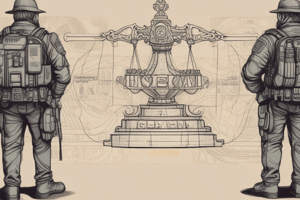Podcast
Questions and Answers
¿Cuál de los siguientes no es un objetivo de la nueva ley de Enjuiciamiento Civil?
¿Cuál de los siguientes no es un objetivo de la nueva ley de Enjuiciamiento Civil?
- Mejorar la imagen de la justicia para hacerla más accesible
- Reducir el tiempo necesario para una determinación definitiva del caso
- Establecer un sistema judicial que sea más coherente y tome en cuenta los diferentes aspectos del sistema legal
- Establecer un sistema judicial que sea más complejo y restrictivo (correct)
Flashcards are hidden until you start studying
Study Notes
-
The Spanish Cortes have approved and I am sanctioning the following law.
-
The goal of effective judicial protection is expressed in article 24 of the Spanish Constitution and coincides with the social need for a new civil justice characterized by effectiveness.
-
Efective judicial protection means that procedural guarantees are fully realized and that judicial responses are quicker, closer to the time of the request for protection, and with greater capacity to transform real life situations.
-
It means a set of instruments aimed at shortening the time necessary for a definitive determination of the legal matter in specific cases, that is, less distant judgments, more affordable and effective provisional measures, forcible execution that is less burdensome for those who need to pursue it and with more chances of success in satisfying legitimate rights and interests.
-
Neither the nature of civil or commercial debts nor personal and family situations requires a period of years until a effective resolution can be achieved, with the potential to produce real transformations in the lives of those who have needed to go to court.
-
Efective judicial protection must mean an approach to the justiciable that does not consist of improving the image of justice, to make it seem more accessible, but rather in structuring judicial proceedings so that each case is better followed and known by the court both at the initial presentation and in the eventual need to clear the existence of procedural obstacles -nothing more ineffectual than a process with an absolute judicial decision by the tribunal- and in the determination of what is truly contested and in the application and evaluation of evidence, with oral testimony, public disclosure, and immediacy.
-
This new Civil Law of Enquiry law is based on the overall interest of the justiciable, which is equivalent to the interest of all legal subjects and, as such, of the entire society.
-
It does not ignore the experience, the points of view and the proposals of all the professional participants in civil justice, but it is first and foremost aimed at those who demand or may demand judicial protection, truly effective judicial protection, for their rights and legitimate interests.
-
The law was written to address the failings of the old justice system and to provide a better system that is more effective.
-
The new law is based on the idea that justice should be delivered quickly and with as few disruptions as possible.
-
The new law reduces the amount of time it takes to resolve cases and ensures that the process is properly prepared.
-
The law is designed to be more coherent and to take into account the different aspects of the legal system.
-
The new law is based on the idea that judges should be able to understand and use the full range of legal options available to them.
-
The new law is designed to be more user-friendly and to be more in line with modern day practices.
-
The new law is expected to improve the effectiveness of the justice system.
-
The new civil law system should be based on principles, rules and standards of permanent value, as enshrined in civil procedural law of other countries in our cultural area.
-
The social changes that have taken place over the past few decades call for a complete overhaul of the judicial system.
-
A new civil law system that tackles a number of problems that are difficult or impossible to resolve with the law of the century past will be necessary.
-
A new civil law system that is based on principles, rules and standards of permanent value will be necessary to reflect the change in society's attitude towards the judicial system.
-
The official work on a new civil law system that has been taking place for the past few decades has been very comprehensive and intensive.
-
The aim of this law is not to be overly meticulous or restrictive, which is often seen as a characteristic of foreign procedural law, but to provide clear and concise answers to the legal questions that have been raised over the years.
-
There is nothing new in the area of this law that is not already reflected in the law or jurisprudence of the past few decades. It has been deemed necessary to provide clear and concise answers to legal questions that have been raised over the years, in a way that is not hampered by a lack of guidance from the law.
-
The main purpose of this law is to simplify the judicial process.
-
The law focuses on eliminating redundant language, fixing deficiencies in regulation, and creating a new order for declarative processes, resources, compulsory execution, and cautelary measures that is clear, simple, and complete in light of the reality of civil litigation and people's rights, duties, and burdens.
-
The law uses a language that is more accessible to any citizen, eliminating obsolete expressions and more closely resembling forensical terms that are tied to old judicial practices.
-
Internal remissions are reduced as much as possible, particularly those that provide no information about the precept being referred to.
-
Articles are divided into numbered sections, with each one designed to stand on its own, in contrast to the simple paragraphs found in other laws.
-
The law is aimed at being a procesal common law, and in order to achieve this, the current Organic Law of the Judiciary, of 1985, is limited to what it refers to as its "functions," and is adjusted to match what is stated in the first paragraph of article 122 of the Constitution.
-
The reference in article 122 to "the functioning of courts" cannot be understood as referring to the rules of procedure, which are mentioned instead.
Studying That Suits You
Use AI to generate personalized quizzes and flashcards to suit your learning preferences.




